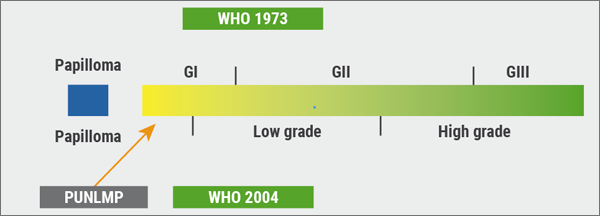FGFR3 activating mutations are known to be associated with favourable prognosis in bladder cancer [1], yet little is known about whether immunohistochemical detection of overexpression of FGFR3 is a relevant prognostic tool. Because the FGFR3 receptor is an actionable target and there are drugs in the pipeline, Dr Mertens took 1,000 cN0M0 (chemo-naïve) bladder cancer patients who underwent radical cystectomy (in 9 hospitals) and concomitantly screened them for FGFR3 mutation as well as overexpression. Specimen review by uro-pathologists confirmed that 89% of patients had a tumour ≥pT2.
An FGFR3 activating mutation (the most common mutation is p.S249C) was found in 11% of the samples; and of those tumours, 73% demonstrated FGFR3 overexpression as stained by immunohistochemistry. In the FGFR3 wildtype subset of tumours, 22% had overexpression of FGFR3. Notably, p53 overexpression was 69% throughout the cohort (cut-off is 10%), but the relevance of this finding is not yet clear.
Conclusions of this study were: (1) FGFR3 mutation has favourable prognostic impact regardless of FGFR3 protein expression level; (2) FGFR3 overexpression has no prognostic impact in tumours with wildtype FGFR3 sequence; and (3) gene sequence of FGFR3 should be used in the selection for targeted therapy with anti-FGFR3 agents in the future. Developments in this field should be watched carefully because FGFR3 mutation itself seems to be the key driver, not just amplification of the protein levels.
Posted on
Previous Article
« Focus on treatment of erectile dysfunction and Peyronie’s disease Next Article
When to use imaging and imaging-guided therapies »
« Focus on treatment of erectile dysfunction and Peyronie’s disease Next Article
When to use imaging and imaging-guided therapies »
Table of Contents: EAU 2019
Featured articles
Prostate Cancer
Barentsz Trial – Bi-parametric MRI versus multi-parametric MRI
Enzalutamide plus ADT improves outcomes for metastatic hormone-sensitive prostate cancer
Prostate cancer active surveillance: Better patient risk stratification and use of imaging
The role of pelvic lymph node dissection in prostate cancer: Extended vs standard
When to use imaging and imaging-guided therapies
Radioguided surgery is the future?
Bladder Cancer
Largest safety study of its kind with atezolizumab in metastatic bladder cancer
Bladder cancer risk and early detection
Consensus treatment pathway for patients with limited pelvic lymph node involvement in otherwise localised bladder cancer
FGFR3 gene mutation: Favourable prognostic impact in bladder cancer
Bladder cancer in young patients
Spanish study directly links surgical volume with mortality in bladder cancer patients undergoing cystectomy
Updated interim results of phase 2 trial of pembrolizumab for high-risk NMIBC unresponsive to BCG
Robot-assisted radical cystectomy or open radical cystectomy?
Renal Transplantation and Renal Cell Carcinoma
Andrology
Microdissection testicular sperm extraction (microTESE)
Male infertility/Premature ejaculation
Testosterone replacement therapy: Safe and maybe even protective
Focus on treatment of erectile dysfunction and Peyronie’s disease
Penile prosthesis implantation
Functional Urology
Decision aids are too difficult for patients
Lower Urinary Tract Symptoms
The Urodynamics for Prostate Surgery Trial
Minimally invasive surgical techniques must compete against pharmacotherapy in benign prostate hyperplasia (BPH)
Related Articles

May 21, 2019
Bladder cancer risk and early detection
© 2024 Medicom Medical Publishers. All rights reserved. Terms and Conditions | Privacy Policy

